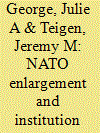| Srl | Item |
| 1 |
ID:
121813


|
|
|
|
|
| Publication |
2013.
|
| Summary/Abstract |
An enduring assumption exists in the United States that past military service casts electoral candidates in a positive light. To demonstrate how voters understand candidates' military experiences, it is necessary to understand how their attitudes about a candidate change when exposed to biographic information. This study uses an experimental design to evaluate whether voters see candidates with a military background as better able to handle defense and security issues, are more capable leaders, and whether voters express higher affect toward veteran candidates. Using manipulated television advertising and handbills from an actual election, along with variation of the party information about the candidate, this study finds that voters are unmoved in their impressions of leadership and their affect toward a candidate with military experience. However, potential voters report markedly higher evaluations of candidates' ability to handle defense and security issues when exposed to the military cue, irrespective of party affiliation.
|
|
|
|
|
|
|
|
|
|
|
|
|
|
|
|
| 2 |
ID:
085672


|
|
|
|
|
| Publication |
2008.
|
| Summary/Abstract |
States' conscription policies reveal much about their security climate, economic constraints, political debates, and social norms. While conscription has waned among democratic countries, several states maintain it as a way to socialize and educate their citizens. As post-communist states embrace Western influence and NATO, many have ended compulsory military service. In post-Soviet Georgia, however, conscription policy is a microcosm illustrating the difficulties of bridging security vulnerabilities, political upheaval, and resource realities. Although previous scholarship predicts that security and economic needs should supersede other considerations, we find that the domestic political context looms larger for decision makers of transitioning states
|
|
|
|
|
|
|
|
|
|
|
|
|
|
|
|